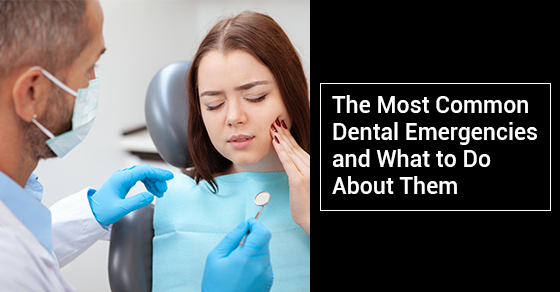
Patients often think that dental emergencies only occur if they experience a lot of pain or have severe damage following an accident. However, dental emergencies come in many different forms. As a result, many emergencies might be less obvious to the average person.
The problem with not recognizing dental emergencies is that the longer they remain untreated, the more serious they become. To help you recognize dental emergencies, here are some of the most common situations requiring the emergency dental services and what to do about them.
This tops the list, as it is a serious issue affecting either the root of your tooth or the area between your gums and teeth. Abscesses appear as almost a “pimple” on your gums, with a red sore and white head. Never try to “pop” the abscess. Instead, call our office immediately because, if left untreated, the infection can spread. Unlike many other tooth issues, your only choice to treat the infection is to seek emergency dental services.
If you wake up to find you are experiencing tooth pain, then call us right away. Ongoing tooth pain is not normal and can indicate issues that aren’t always obvious. First, call and ask if you can set up an appointment to find out what is causing the pain. Be sure to explain the symptoms, so we know you require immediate attention.
To help manage pain, you can take an over-the-counter painkiller. You can also use an ice pack applied to the outside area where you feel the pain. Applying heat is not advised, as it can make the pain worse. You can also rinse your mouth with warm water, and then try flossing and brushing in case there is something lodged in the area causing irritation. Be gentle to avoid making the pain worse.
This is a more obvious dental emergency. However, often, if there is no pain, or the lost tooth is not visible, people don’t bother to call the dentist. Always call the dentist when a tooth is knocked out because we can usually save the tooth. If possible, gently put your tooth back in place, and go to the dentist right away; your chances of saving the tooth will be greatly increased.
If you feel nervous about putting the tooth back in place, you can place it in a small container of milk or water and bring it with you. Never rub the tooth to try and clean it off, as you can remove vital tissue that will help us save it. As long as you see us within an hour, you should be able to avoid losing your tooth.
If you break or chip a tooth, even if it doesn’t hurt, this is considered a dental emergency. You should save any pieces of the tooth in a small container with milk or water. Then, wash your mouth with warm water to rinse away blood. If the tooth is still bleeding, you can apply gauze to the area to help control it. Apply a cold compress on the outside of the mouth in the area of the damaged tooth and then head to your appointment. If the tooth left behind has sharp edges, you can place sugarless chewing gum over it to help avoid cutting your cheek or tongue.
Losing a filling is never good, as it exposes the cavity. While not all lost fillings reveal decay, often, it is new decay that caused the filling to become loose in the first place. As above, you can use sugarless gum to fill the cavity temporarily. Give us a call, and we can set up an appointment to examine the tooth and then restore the filling.
When a crown falls out, hopefully you can find it and bring it to our office. Often, the crown is in good condition and can just be recemented. You might experience pain, which you can ease by applying a small amount of clove oil to the area. You can also try to replace the crown using toothpaste to help hold it in place. Never use glue! We use a special cement to put it back in place permanently.
If you notice a piece of your braces has come loose or has snapped and is sticking out, you should see us right away. The broken piece can cause injury, but also interferes with the integrity and progression of your treatment. Never try to clip the wire. Instead, you can use dental wax to put the loose piece back in place, or use wax to help protect your cheek and tongue from cuts. We will recement the damaged area or, in some cases, it might need to be replaced.
This is different from losing a tooth outright. In this case, the impact to the tooth has forced it out of position. While chances are the tooth will eventually fall out, it is best to visit our office to see what can be done. If you feel pain, take an over-the-counter pain medication, and apply cold compress to the outside area.
While this might seem more of a frustration than a dental emergency, having something caught between your teeth can lead to a whole lot of woes. First, try to see if you can remove it yourself using floss. Don’t use anything else, as this can damage your teeth or gums. If the floss doesn’t work, give us a call and we will see you as soon as possible to safely remove it before it can cause an infection.
While you can’t necessarily avoid all dental emergencies, there are some precautions you can take to reduce risk, including:
If you do require emergency dental services in Oakville, or aren’t sure about the changes you notice to your teeth or gums, always call our team at Oakville Place Dental to discuss your concerns.
 0 Comment
0 Comment